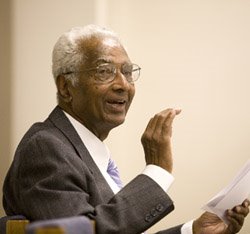
The religious experience of one who follows the Jaina tradition cannot be properly understood without first grasping the theory of "existents"
| Jaina arguments against the theory of a world-creating God are basically twofold:
|
he is forced to rely a great deal on his own initiative and effort, both for his worldly requirements and for this salvation.
He is therefore in need of a philosophical system that neither demands too much unquestioning faith nor is at variance with everyday experience.
The authority of the Jaina teachings rests ultimately on the fact that they were preached by an omniscient being; thus they are every bit as unverifiable and dogmatic as those accepted by an orthodox Hindu or Christian.
Nevertheless, Jaina teachers claim that only the teachings of the Jina can stand the scrutiny of reason; they further contend that in comparison with other religions (for example, Vaisnnavism or Saivism).
| For the Jaina rejection of the “divinity" of Hindu gods and the “asceticism" of Saiva and Vaisnava mendicants,see Handiqui 1949: 326-376. |
Almost all the works mentioned in Chapter II, particularly those included under Dravyanuyoga, make a point of critically examining the doctrines of other philosophical schools. While these doctrines are invariably described as "wrong on account of their one-sidedness, it is, nevertheless held that from the proper perspective (that, of syadvada, discussed below), they can be well integrated into the Jaina system.
 Padmanabh S. Jaini
Padmanabh S. Jaini

